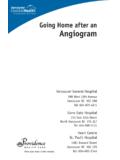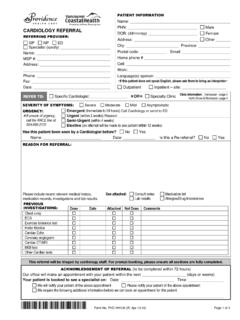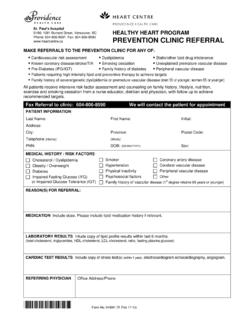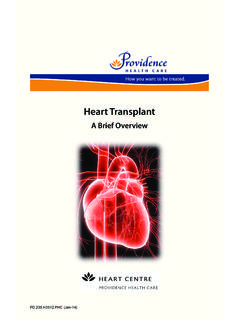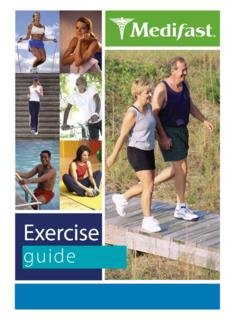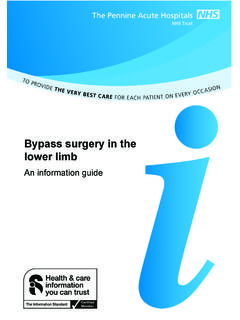Transcription of Going Home after Percutaneous Coronary …
1 Going home after Percutaneous CoronaryIntervention (PCI) Vancouver General Hospital899 West 12th Avenue Vancouver BC V5Z 1M9 Tel: 604-875-4111 Heart CentreSt. Paul s Hospital1081 Burrard Street Vancouver, BC V6Z 1Y6 Tel: 604-682-2344 1 The heart and Coronary arteries ..1 Discharge instructions ..2 Dressing care ..3 Medications .. guidelines ..6 Special considerations ..7 Sexual activity ..7 Special considerations ..7 Driving ..8 Returning to work ..8 Cholesterol and diet ..9 6 steps to heart-healthy eating ..9 Smoking ..10 Alcohol ..10 Community and other resources ..11 Cardiac education ..11 Cardiac exercise programs.
2 12 Nutrition for a healthy heart ..13 Stop smoking ..14 Stress management ..15 Table of ContentsFront ViewBack ViewThe Heart and Coronary Arteries231. You must make follow up appointments with your:a) Family Doctor in one week: _____b) Your referring Cardiologist or specialist in one month: _____2. Ask your family doctor about your return to work3. The BC Motor Vehicle Act has regulations about driving for heart patients. Ask your family doctor and see page a) Do Not Stop Aspirin without asking your ) Do Not Stop clopidogrel (Plavix ) before your prescription is finished without asking your Do Not have a magnetic resonance imaging (MRI) scan during the First 6 Weeks after stent place-ment without a cardiologist s Metal detectors do not affect the stent(s).
3 Refer to the Centre Page for your medication InstructionsDressing Care You may remove the bandage 1 day after your Percutaneous Coronary Intervention (PCI). You may shower 1 day after your PCI. Do Not sit upright for more than 1 hour at a time during the first day at home . If traveling for long periods, stretch your legs out and get up and walk every hour during the first day Going home . You may see a hematoma (soft lump or bruise) around the hole or even down the leg where the PCI was done. This is normal. It is Not Normal when the hematoma suddenly gets bigger or harder. This means you are bleeding. If this should happen you must: Lie down Ask someone to Press Down Hard for 15 Minutes just above the hole where the PCI was done.
4 You will know if you are doing this right if the hematoma does not get bigger or harder. Do Not Stop pressing to check under your fingers during the first 15 minutes. If the bleeding has stopped after 15 minutes, rest and lie down for 2 more hours before getting : If the bleeding does not stop after 15 minutes,Call 911for an ambulance to take you to the your safety, we recommend that you: Know the names, doses and how often you take all the medications prescribed to you by your doctor. Know Why you are taking all your medications. Always bring a current list of your medications and the correct pill bottles each time you go to the hospital.
5 Talk with your doctor before taking any herbal community pharmacist is a good the centre pull-out for your medication calendar. ACE Inhibitor: Lowers blood pressure, improves heart function, reduces risk of heart attacks and prolongs life. For example: captopril, enalapril, ramipril and tradenomes. Anticoagulant ( blood thinner ): Prevents clots in blood vessels and many other conditions, reduces risk of heart attacks and prolongs life. For example: warfarin (Coumadin ). Warfarin (Coumadin ) Is Not a substitute for Aspirin or clopidogrel (Plavix ). Antiplatelet ( blood thinner ): Prevents clots in blood vessels, reduces risk of heart attacks, prevents clots in newly placed stents and prolongs life.
6 For example: Aspirin and clopidogrel (Plavix ). Do Not Stop Aspirin without asking your cardiologist. Do Not Stop clopidogrel (Plavix )before your prescription is finished without asking your Common Types of Cardiac Medications Angiotensin Receptor Blocker (ARB): Lowers blood pressure, improves heart function and can be used as a substitute for ACE Inhibitors. For example: candesartan, losartan and valsartan. Beta Blocker: Lowers blood pressure and heart rate, reduces angina, improves heart function, reduces risk of heart attacks and prolongs life. For example: acebutolol, atenolol and metoprolol. Calcium Channel Blocker: Treats angina, lowers blood pressure and can be used to control heart rate.
7 For example: amlodipine, diltiazem, nifedipine, verapamil and felodipine. Lipid Lowering Agent: ( statin ) Lowers cholesterol and other fats in the blood, reduces risk of heart attacks and prolongs life. For example: atorvastatin, lovastatin, pravastatin, simvastatin, gemfirozil and niacin. Your community pharmacist is a good resource for more information See the centre pull out for your medication calendar. In about 25% of patients who have had a PCI, angina comes back. Treat the angina the same way as you did before your PCI: Lie down. Nitroglycerin - spray once under the tongue If the pain doesn't get better after one spray, or gets worse, Call 911 If the angina stops, tell your family doctor as soon as you can.
8 Remember to check your nitroglycerin for the expiry dateAngina67 The purpose of a PCI is for you to return to your previous level of activity and enjoy life. However, during the initial period after the procedure, common sense and moderation are recommended. No heavy activities for 5 Days. For example: Do Not lift, push or pull anything that weighs more than 10 pounds ( heavy laundry, groceries or a golf cart). Do Not exercise aggressively, golf, vacuum, mow or rake lawns, or move furniture. after the first 7 days, after you have seen your family doctor, it is important for you to do moderate exercise for 30 minutes or more, 5 times a week.
9 This will strengthen your heart. If you were not exercising before, walk daily with a gradual increase in distance and speed. An example of a walking schedule is:DayBlocks OutBlocks InTotal Blocks123456789101/211 1/222 1/233 1/244 1/251/211 1/222 1/233 1/244 1/2512345678910 Exercise Guidelines Aim for a goal of 24 blocks out and 24 blocks in, about 36 minutes each way. See page 12 to find a cardiac exercise program near you. Special Considerations: Always carry your nitroglycerin spray or tablets with you. Do Not walk immediately after meals; wait 1 hour. Walking in extreme temperatures, such as very hot summer days or cold, rainy or snowy winter days.
10 This can increase tiredness and angina. You should avoid this. Ask Your Cardiologist when you can resume sexual activities. As a Rule, you may resume sexual activities if you can: Climb 2 flights of stairs at a fairly brisk pace without: becoming short of breath or having angina Special Considerations: Many medications can affect sexual function. Do not stop any medications on your own. Discuss this with your doctor first. Do Not have sexual activities to prove that you have recovered. Do not begin sexual activities immediately after meals; wait 2 hours. Avoid sexual activity after drinking alcohol, smoking or if you feel tired.


